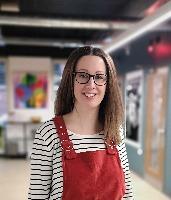Becky McGuinness is the Community Manager for the Open Preservation Foundation
In October, the Open Preservation Foundation attended the ‘All Things Open’ conference. Two of the themes it focused on this year were community leadership and diversity and inclusion, which are central to much of our recent and ongoing work. In this post, I’ll share some key takeaways from the event in the context of Digits: For Good, including celebrating the growth of open source, ensuring tech access for the underrepresented, the importance (and pitfalls) of community leadership, and best practices for creating a diverse and inclusive community.
In one of the keynotes, Erica Brescia, COO of GitHub, spoke about how open source has become a key driver of innovation in technology. Open source software is used in every sector and the amount of software is expected to grow exponentially in the next 10 years. As well as its increasing popularity across sectors from medicine and healthcare to memory institutions such as libraries, archives, and museums, the use of open source is expanding geographically. Five years ago, the majority of contributions came from the western world, but today, the epicentre of open source development has moved to developing nations with a huge increase in participation from India, Africa, China and Latin America. To support this growth, there will need to be more contributors, maintainers and commerce to meet demand. More importantly, there is a need for inclusive communities that support wide participation and access to essential knowledge and resources for those who are often underrepresented.
Because it both relies on and serves a community of users, open source software is well positioned to build projects and communities with a globally inclusive and accessible perspective. However, the health of open source depends on the existence of a culture where anyone can be a contributor and grow to be a maintainer. There are currently more than 50 million developers on GitHub, and Erica expects this to double in the next decade. Open source software is now a viable career path, but there is still work to be done to remove barriers.
MailChimp’s Johnny Preyer and Jason Brewer talked about how the Covid-19 pandemic has highlighted the importance of connectivity, revealing their vision to address systemic inequality in the US by making internet access a universal utility. On tackling the tech skills gap, they argued that, while donations of time and resources can be a stretch for smaller organisations, many of us in open source (as in digital preservation) are part of large communities whose power should not be underestimated. Take the She Code Africa initiative: through self-organization and community leadership, they’re celebrating and empowering women in tech across Africa by building a sustainable network that embodies technical growth, networking, mentorship and visibility.
Deb Nicholson, General Manager of the Open Source Institute, facilitated a discussion about what makes a sustainable community. One of the core messages was that a community should not rely on one person. Leadership is important to make things happen, but for a community to be healthy and sustainable, responsibilities need to be shared. Other speakers and attendees gave insightful suggestions as to how this could be achieved:
-
A clear vision and good documentation is vital to help lower barriers to participation.
-
It is important to set expectations, especially in smaller communities.
-
A code of conduct can help make the community more welcoming and diverse.
-
Knowledge sharing and training supports more people to contribute at different levels and others to take a break.
-
Leaders and ‘spiritual mascots’ should take a step back to enable and empower others to be heard.
-
Succession planning aids long term sustainability.
There’s a lot that we in digital preservation can learn from the open source community. Year on year, digital preservation is becoming more global, diverse, and connected, but there is still a long way to go. As long-time supporters and maintainers of open source digital preservation software, much of what we do at OPF is aimed at cultivating inclusive communities around our tools in order to foster openness and long-term sustainability. As Charlotte talked about in a recent blog post, we’re learning the value of taking a similar approach to equity, diversity and inclusion in digital preservation. We’re working on creating a healthy and sustainable network to support our products, our members, and the wider community, and World Digital Preservation Day is a great opportunity to learn from our peers, recognise the amazing work being done in our field, and celebrate the diversity of people, places and organisations that comprise the global digital preservation landscape.
